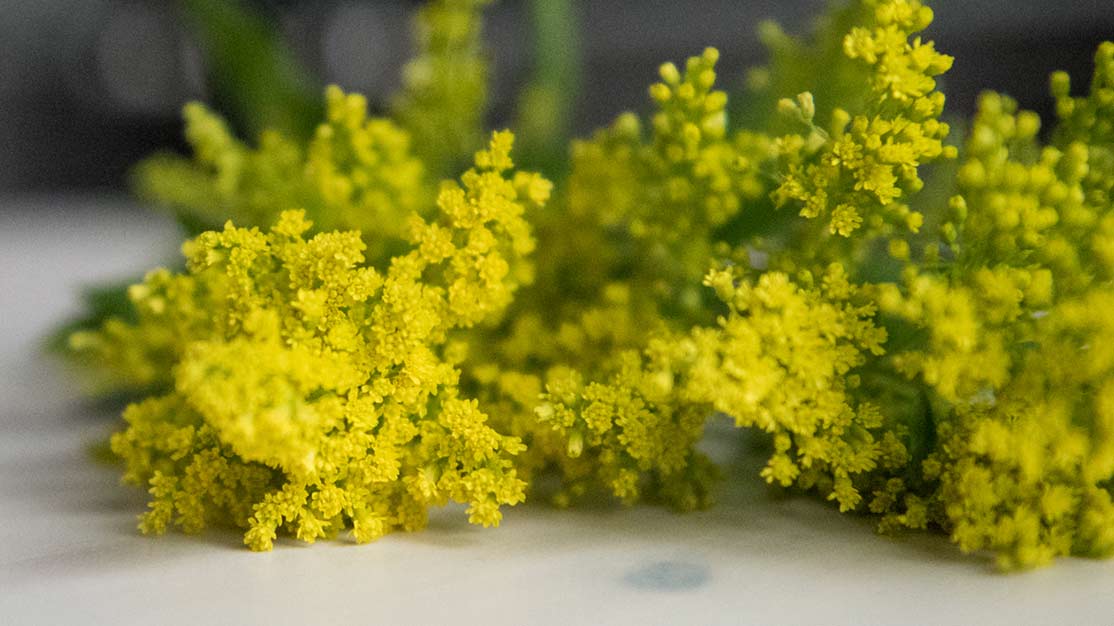Pollen Basics for the Allergy Sufferer

If you suffer from seasonal allergies or hay fever, the word pollen might conjure images of sneezing, a runny nose and itchy eyes.
But just what is pollen?
What is pollen?
Pollen is the male fertilizing agent of plants, grasses, trees and weeds. It's a small, light and fine yellowish powder that's carried by the wind, bees, birds, insects and other animals. The spread of pollen helps fertilizes plants. You may notice clusters of pollen floating in the air, or you may notice clusters present on a plant if you look closely.
What are pollen allergy symptoms?
While beneficial for plants, the spread of pollen can wreak havoc on people with seasonal allergies. Many people are allergic to ragweed pollen, grass pollen and tree pollen. In people with pollen allergies, the immune system mistakes pollen for a harmful substance and creates antibodies to help protect you. The antibodies trigger the release of chemicals, including histamine, to defend the body from the allergen. The release of these chemicals is what is responsible for causing an allergic reaction. You may have symptoms like sneezing, itchy eyes and nasal congestion.
What is the pollen forecast?
Pollen forecasts estimate how much pollen an allergy sufferer is likely to be exposed to in the future. Forecasts are predicted based on a number of factors including the previous year's pollen counts and current weather conditions. It can only predict trends for groups of pollen so even if the overall pollen level is high, it doesn't necessarily mean that your allergy symptoms will be affected. This is because the overall level reported may not always represent the amount of the specific pollen to which you're allergic. To determine actual pollen counts for trees, grass, and weeds present in the air, organizations such as the National Allergy Bureau use counting stations to collect pollen. Certified counting sites are across the United States and may report the pollen count today for your area.
How do you reduce your exposure to pollen?
While you can use allergy medications to address and control pollen allergy symptoms, it is a good idea to remain indoors between 5:00 a.m. and 10:00 a.m. (this is when pollen counts peak) when pollen counts are typically high. You should also keep the windows to your house and car closed to reduce your exposure to pollen.
What is bee pollen?
Bee pollen is the term for plant pollen that has been gathered from plants by bees and brought back to the beehive. It contains many vitamins and minerals as well as proteins, fats and carbohydrates.
Bee Pollen Uses
Some people believe that bee pollen may have health benefits due to the nutritional content and its traditional use in folk medicine. However, at this time, there is not enough evidence to support that bee pollen use is linked with any health benefits. More research is needed to further explore the potential effects of bee pollen.
Updated on April 5, 2021
References
https://www.niehs.nih.gov/health/topics/agents/allergens/pollen/index.cfm
https://acaai.org/allergies/types/pollen-allergy
https://www.aaaai.org/conditions-and-treatments/conditions-dictionary/pollen
https://www.aaaai.org/conditions-and-treatments/library/allergy-library/hay-fever-pollen-counts
https://www.webmd.com/balance/bee-pollen-benefits-and-side-effects